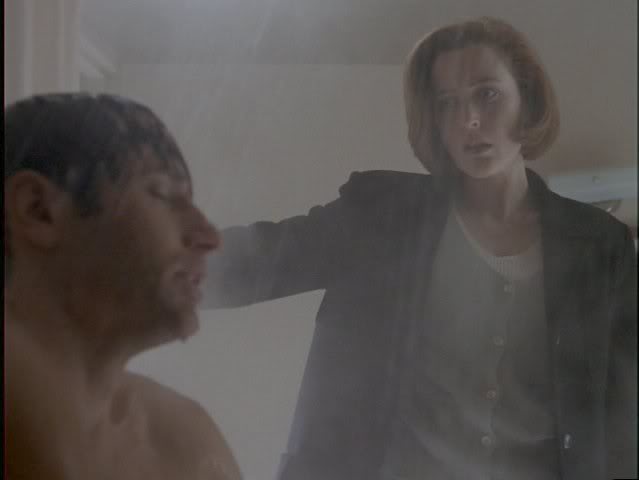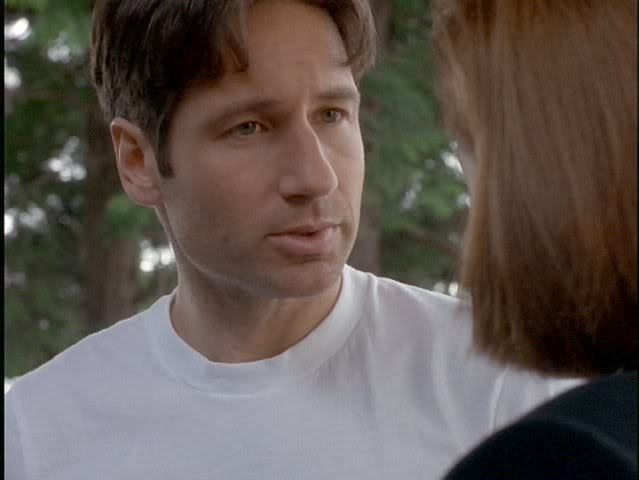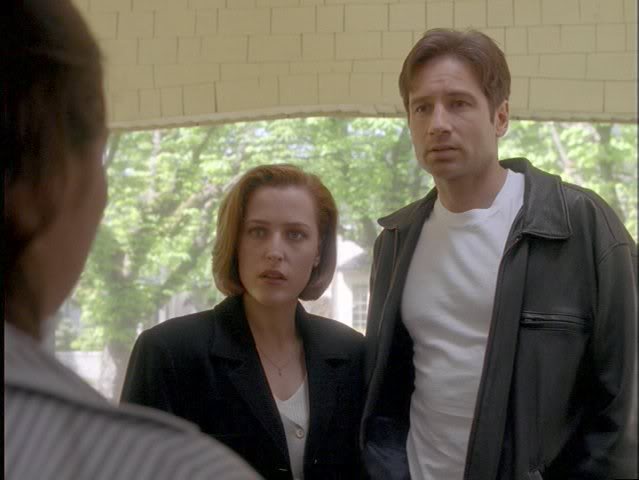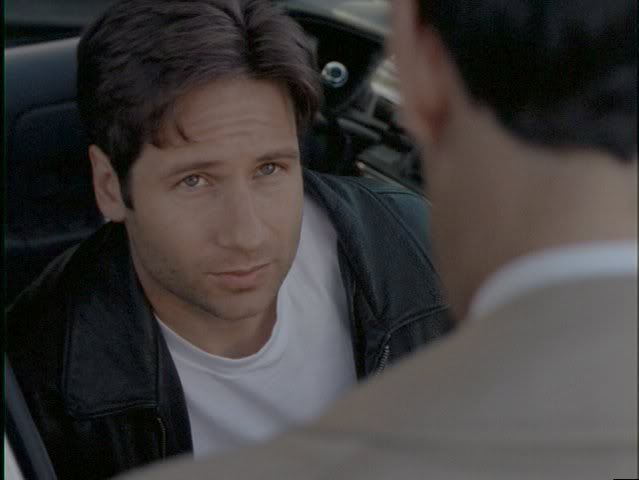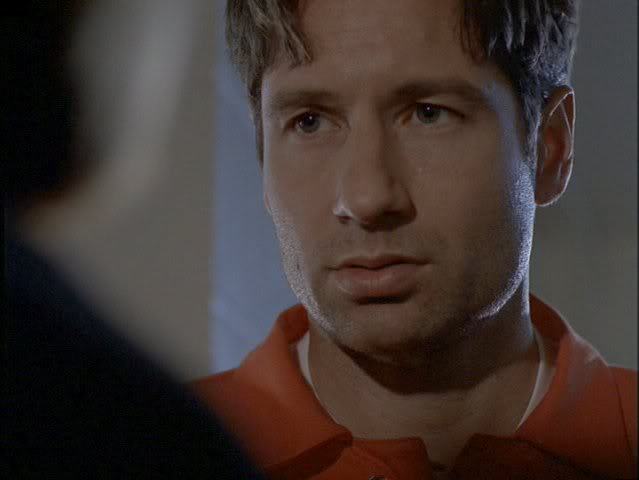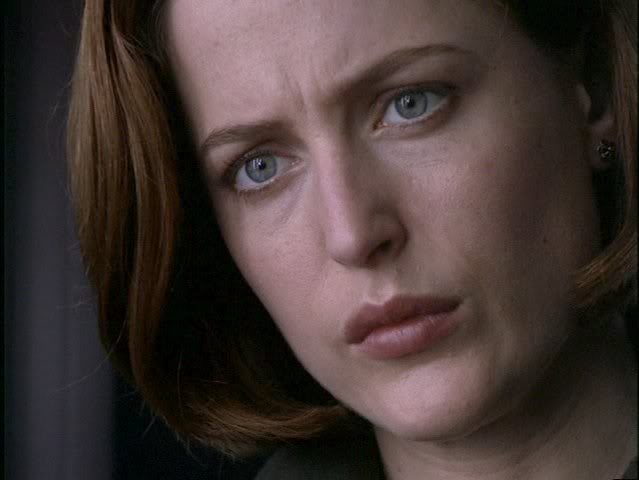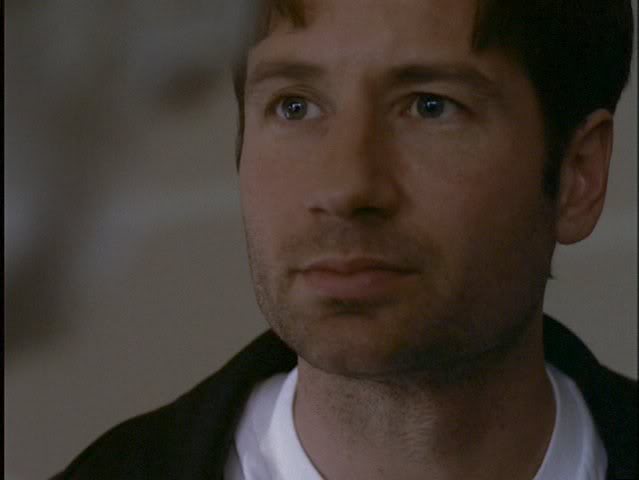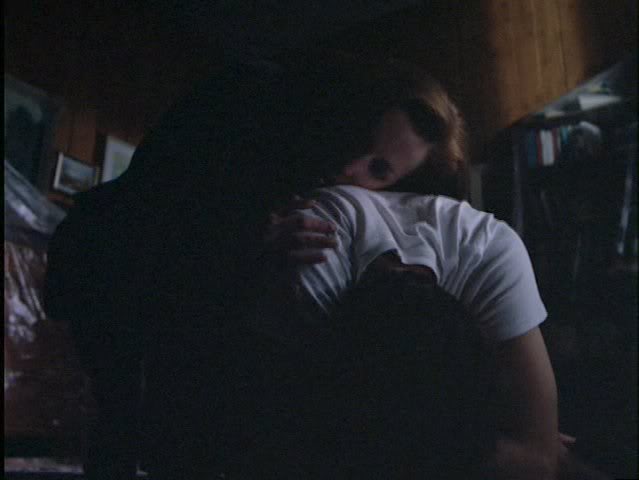CTP Episode of the Day - 11.17.06 - Demons
Today's Cherished Episode: Demons (4x23)
Original Air Date: May 11, 1997
Written By: R. W. Goodwin
Directed By: Kim MannersAfter experiencing a series of blackouts and seizures -- and what might be the recovery of repressed memories -- Mulder gains new insights into his younger sister's abduction. However, while taking his inner journey, he may also have murdered two people.
"I had those people's blood on my shirt, Scully. I was missing for two days. I have no recollection of my actions during those two days. There were two rounds discharged from my gun. I had the keys to this house, the keys to their car. Do the words 'Orenthal James Simpson' mean anything to you?"
Some "Demons" Tidbits & Musings:
-- A secondary definition for "Demon" is "a persistently tormenting passion." In the script, Dr. Goldstein told Scully that Mulder said he was "going to exorcise his demons."
-- Early in the 1996-97 season, Bob Goodwin had a vision. "I saw Mulder waking up in a strange place having no idea how he got there," said the executive producer. "I fleshed it out a bit, told the story to Chris -- who needed scripts, and had been asking me for a while to write one -- and the next thing I knew, it was on the schedule."
-- Goodwin, who headed the Vancouver production office of The X-Files, had written many TV and feature film scripts, but the last one was for the NBC series Mancuso, FBI, which went off the air in 1990. So he swallowed hard, he said, and carved out the time to write "Demons" by sacrificing six weeks of whatever home life his demanding job afforded him.
-- Goodwin admitted cheerfully that he lifted several of the major plot devices for "Demons" from An Anthropologist on Mars, a book of short essays by the writer-neurologist Oliver Sacks. In a case study titled "The Landscape of Dreams," Sacks told the story of Franco Magnani, an Italian-born resident of San Francisco whose life was driven by the strange ability -- at least partly attributable to "Waxman-Geschwind" or "Dostoyevsky" syndrome -- to recall every sight, sound, and smell of his childhoood. Magnani's meticulously accurate paintings of Pontito, his native village in Tuscany, have been the subject of several medical symposia and art exhibitions.
-- The on-screen notion that Waxman-Geschwind syndrome could be induced by drugs and/or electrical impulses was a bit of creative license; so were the opaque flashing eyeglasses applied to Mulder by the self-righteous Dr. Goldstein. "They were based on this New Age 'brain stimulator' that we bought," said Goodwin. "They were supposed to help you to relax and improve your creativity, but I found them disconcerting; they freaked out my twelve-year-old completely, and my wife [actress Sheila Larken, who played the recurring role of Margaret Scully] couldn't sleep for days."
-- Neither, after watching the episode, did some viewers, for rarely are such realistic and nauseating levels of pain inflicted on the stars of prime-time TV shows. But Chris Carter felt, said Goodwin, that the episode was a good bridge between Scully's near-death sentence in "Elegy" and the apocalyptic events of the season finale to come.
-- This was the only episode written by Bob Goodwin, and only the second time a director or crew member wrote an episode. The first was "Wetwired," written by X-Files special effects maven Mat Beck.
-- The Australian-born, Los Angeles-raised Goodwin wrote and directed documentaries for the award-winning local program Ralph Story's Los Angeles while doing improvisational comedy in night clubs as a member of the group Credibility Gap. He worked his way up the film ladder, from locations manager to producer, including a brief, harrowing experience producing Star Trek: The Motion Picture (he left the production in a dispute over credit shortly before the film was released in theaters). In 1993, fed up with the smog and crime of Los Angeles and disillusioned by what he and Larken perceived to be a poor social and school environment in which to raise their children, Goodwin moved his family to Bellingham, Washington. "I sent out letters to everyone saying 'I'm moving to the Pacific Northwest.' I went on vacation, and the second night I was there, Chris Carter called me about [The X-Files] and asked me to help produce the early episodes."
-- As part of his job, Goodwin would greet first-time X-Files directors at Vancouver's airport with the refrain, "Welcome to the most difficult show on television."
-- "The nature of The X-Files is that it's a different story in a different setting every week," said Goodwin, "which means it is not like most episodic television. Each X-File is a brand new story, with a new supporting cast, new special effects and new problems -- and it all has to be invented from scratch. It's the equivalent of making a feature film every eight days."
-- "I would have loved to be able to work in Seattle, but Seattle has not developed any kind of a presence in this business," Goodwin said. "They have not done anything to make it attractive financially, and they haven't trained anybody. You come to Vancouver and you have enough crews to service 30 shows, you have soundstages, you have equipment houses, labs, and everything you need to make films -- as well as very talented crews, which is the most important of all."
-- In addition to supervising a crew of some 300 technicians in Vancouver, training new directors, organizing shooting schedules, and approving locations, at the end of Season 2 Goodwin began the tradition of directing the first and last X-Files episode of every season, until his final directing assignment before leaving the show, Season 5's "The End." (He directed the final episode of Season 1, "The Erlenmeyer Flask," but did not direct the Season 2 opener, "Little Green Men.")
-- "The thing that made directing The X-Files so difficult was that, as in any profession, people have different strengths and weaknesses," Goodwin said. "Some directors are very good with actors, dramatics, and staging. Some directors are great with the camera, they're very cinematic. Some directors are really good with action. Some directors can do suspense well. Some directors know how to use special effects well. But when you come to The X-Files, you have to be able to do all of that. Because if you can't do all of that, you can't do the show."
-- In writing "Demons," Goodwin named victims David and Amy Cassandra for the Greek Prophet Cassandra. The god Apollo fell in love with Cassandra and granted her the gift of prophecy; however, since she did not love him back he cursed the gift by having no one ever believe her prophecies. Much like Mulder, everything she said was true but no one believed her. (Cassandra Spender was also named for the prophetess Cassandra.)
-- The episode legend when Mulder awoke in the teaser said that it was April 12, and Scully told Mulder that it was Sunday; but April 12, 1997, was a Saturday.
-- Once again, a member of the X-Files team breaks land speed records! Mulder woke Scully up at 4:50 a.m. She got up, got dressed, apparently had a jet waiting outside her door to fly her directly to Providence, Rhode Island, rented a car (from Lariat, no doubt), and drove to Mulder's motel, arriving at 6:15 a.m. That's an extreme possibility!
-- It baffles me still: In the many, many times I've watched this episode, I have yet to figure out what in the heck David Duchovny was doing with his hand when he came out of the bathroom wrapped in the towel that Scully provided. It almost looks like he's crossing himself. (If he thought I wouldn't be looking at his hand ... well, he was nearly right. I probably didn't notice it the first ten or twenty times I watched "Demons." < g >)
-- Mulder appeared clean-shaven just before his flashback in the yard of the Cassandra house, but he had a significant five o'clock shadow by the time the flashback was done. (Not that I'm complaining! < g >)
-- During the filming of Mulder's dream sequences, the shutter mechanism of the camera was continuously stopped and started to create the "out-of-time" feeling on the final print. However, most of the weird, dystemporal nature of Mulder's flashbacks was created in postproduction. The sequence's colors were altered during film development, the negative was hit with strobe lights during the printing process, and the recorded dialogue and background noise was filtered and otherwise altered by co-producer Paul Rabwin's small army of editors and mixers.
-- Mulder's dream/flashback sequences featured Chris Owens as the Young Cigarette Smoking Man. He was playing the role for the second time; the first was in "Musings of a Cigarette Smoking Man." Dean Aylesworth (Young Bill Mulder) was also featured in the flashback; he played the same role in "Musings of a Cigarette Smoking Man" and "Travelers."
-- Also featured was Vanessa Morley who was playing Young Samantha Mulder for the last time in "Demons." She previously appeared in "Little Green Men," "Herrenvolk," "Paper Hearts," and "Memento Mori." Alex Haythorne played the young Fox Mulder in the flashbacks, the only time the young actor was used for that role.
-- Compared to Mulder's debilitating brain seizures, the actual filming of "Demons" was comparatively painless. The part of the picturesque cottage that Amy Cassandra compulsively painted, then died in, was played by a rundown farmhouse on a piece of swampy flatland in South Surrey -- not far from the horse farm in "Tunguska" and the Peacocks' hovel in "Home."
-- The house was owned by an absentee landlord, a Maryland woman who had inherited it from her grandmother. It was scouted and rented by Todd Pittston's locations crew, then completely restored, refurbished, and replanted by Graeme Murray's art department, Rob Maier's construction department, and head greensman Frank Haddad.
-- The "Wisteria Cottage" did not appear in the episode in its restored state, however, only in preproduction photographs taken by art director Gary Allen. These photos were scanned by computer playback technician Sally Hudson. She manipulated the images, using two computer programs -- Adobe Photoshop and Fractal Painter -- to produce dozens of laser-printed "paintings" for Amy Cassandra's living room wall. Then, before actual filming began, the house and garden were completely trashed, bringing it right back to the sorry state in which Mulder and Scully first saw it.
-- Jay Acovone (Detective Curtis) was a series regular on Beauty and the Beast, which was produced by X-Files executive producer Howard Gordon.
-- Ill-fated police officer Michael Fazekas was named for co-executive producer Frank Spotnitz's assistant Michele Fazekas. (The character of Michele Fazekas in Season 5's "Detour" was named for her as well.)
-- Oopsie! During the scene between Scully and Detective Curtis in the apartment of the police officer who committed suicide, you could see the moving shadow of a crew member on the wall behind Scully.
-- Rebecca Toolan made her last appearance as Mrs. Mulder until she reappeared in Season 7's "The Sixth Extinction II: Amor Fati" -- and at this point, we still didn't know her first name. X-Philes wouldn't learn Mrs. Mulder's first name was "Teena" until Season 5's "Kitsunegari."
-- I really liked David Duchovny's acting choices in his scenes with his mother, especially how he did not look her in the eye while Scully was in the same room.
-- When Mulder asked Dr. Goldstein to "treat" him again, the time was 9:25 p.m. -- Gillian Anderson's daughter Piper was born on 9/25.
-- Someone tidied up the Mulder family never-used summer house at Quonochontaug, and purchased some new lamps (Mulder smashed them all looking for the alien plam in "Talitha Cumi").
-- The closed captioning for the episode revealed that Mulder had a line after his standoff with Scully n the Quonochontaug house. It was, "I'm so tired. I need to know, Scully. I just need to know."
-- Once & Future Retreads: Jay Acovone (Detective Curtis) was Duffy Haskell in "Per Manum" and "Essence." Andrew Johnston (Medical Examinder) was Colonel Budahas in "Deep Throat" and Agent Weiss in "Colony/End Game." Eric Breker (Admitting Officer) was an Ambulance Driver in "Apocrypha" and a Dark-Suited Man in "Christmas Carol/Emily."
-- For his part, said David Duchovny, the hardest task was to somehow connect the two disparate elements of the script. "Here I was, having holes drilled in my head, and these brainstorms," he said, "and at the same time I was walking around trying to solve the case. The challenge was to make both the seizures and the recovery realistic."
-- This was not Gillian Anderson's favorite episode. "'Mulder, get to the hospital!' 'Mulder, get to the hospital!'" she said. "I had to play the same thing over and over again."
-- As for Goodwin, although he was proud of "Demons," he didn't exactly envision becoming an X-Files staff writer -- or even whispering another story idea in his boss's ear. "It became a real strain on the family," he said. "Mostly what I remember was taking everybody up to Whistler, the ski resort north of Vancouver, for a three-day vacation to celebrate my son's sixteenth birthday. My wife and kids skied and played and all stayed in one condo. I stayed in a condo right next to them -- and spent the entire time writing."
-- Bob Goodwin left the X-Files family at the end of Season 5 -- a decision he made early in 1998 and one that was not influenced by the show's plan to move production from Vancouver to Los Angeles for Season 6. When he first joined the show in 1993, he believed it would last, at best, 12 episodes. "I'll be honest," he said. "I had no idea the show would last, because most shows don't. Usually it takes three elements to make a success: the idea and the scripts, the right cast, and proper presentation. If you do all three things, you have a potential success -- and even then there's no guarantee. But if you don't have any of those three elements, you're dead. I knew from the beginning that The X-Files had those three elements. But luck played a big part too."
-- Chris Carter tried to persuade Bob Goodwin to move to Los Angeles with the show in 1998, but Goodwin felt it was time to take a break from the grind and think about life after The X-Files.. "Five years was enough, quite frankly," he said. "It was really great. It was one of the best experiences of my life, and I am forever grateful to Chris and Fox for it. At the same time, it was enough. I was tired."
-- The full set of DVDs that Haven member Tud has been making for folks here include the Director's Cut of "Demons." If you have it, it's well worth watching. There are several scenes that are slightly different. For example, in the director's cut, when Mulder makes the call to Scully, he is more disoriented as he dials the phone. In the scene outside the motel (with the Cassandras' car), when Scully tells Mulder he needs to go to the hospital, in the director's cut Mulder argues that if he goes to the hospital and it's found out he has done something wrong, he'll be arrested before he can figure out what that was. Also, after Scully told him he was taking a big risk, and he said it was his risk, Mulder added the line, "Besides, if anything happens, I'll be traveling with a doctor."
-- Also on the director's cut, when Mulder went back to Dr. Goldstein and asked for more treatment (after his visit to his mother's house), Goldstein was leery so Mulder pulled a gun on him to force him to continue the treatment.
-- If you don't have Tud's DVDs, these scenes and two others (Mulder's jail cell flashback and the episode climax between Mulder and Scully) which are each slightly different on the director's cut than they were in the aired episode, are available to be viewed on Gertie's Multimedia page. (Thanks, Gertie!) You can find them here: Demons Director's Cut
(Thanks to chrisnu for today's pics.)
Please share your first impressions, favorite (or cringe-worthy) moments, classic lines, favorite fanfic, nagging questions, repeated viewing observations, etc., as today we celebrate "Demons."
Polly
